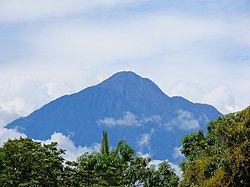Volcán Tacaná is an active stratovolcano that straddles the border between Chiapas in Mexico and the Western Highlands of Guatemala. It is a remote area with rugged terrain that is a popular destination for backpackers, mountain climbers, hikers, and nature watchers. The volcano and its nearby slopes are protected natural areas that constitute a UNESCO Biosphere Reserve.
Understand
[edit]
Tacana is the northernmost volcano in a string of volcanos that runs along the Pacific coast of Central America. Geologists call this group of volcanoes the Central America Volcanic Arc. Tacana stands 4,060 meters high (13,320 ft). The UNESCO Biosphere spans 6,378 hectares.
The most recent eruption was in 1986, but was a minor eruption consisting mostly of a big steam cloud. The last major eruption (with pyroclastic flow) occurred in 70 AD.
History
[edit]Landscape
[edit]The terrain is steep mountain with volcanic rock with zones of temperate forest and rain forest. As you ascend towards the summit you are likely to pass through layers of cloud with foggy conditions.
Flora and fauna
[edit]The area includes a number of endemic species that are specific to Central America, but not found in other parts of Mexico.
The flora consists of evergreen forests with pine, oak, and fir with numerous orchids and bromeliads. The Canaco tree (Chiranthodendron derbianus) is a protected plant species and the Ornate Hawk-Eagle (Spizaetus ornatos) is a protected bird species.
Climate
[edit]Get in
[edit]
There are two entrances to the park, one on each side of the border:
- Mexico - drive to Union Juarez in Chiapas and continue into the village of Talquien. This is about as far as you can go with a car. Pay your park entrance fees at the Parador Talquien and begin your hike up the mountain. It is about a 10-hour hike to the summit from Talquien.
- Guatemala - drive or take a chicken bus to the town of Sabinal. In Sabinal you can hire a 4x4 truck or a guy on a motorcycle to take you to the Hacienditas parking lot to start your hike up Tacana. Shared transportation typically costs 15 quetzals. The road from Sabinal is a twisty dirt road with more pot holes than dirt. If you drove to Sabinal in a rental car, you can park it in town. The parking lot at Hacienditas is safe, but small cars with 2WD probably won't make it up the road.
Fees and permits
[edit]Get around
[edit]See
[edit]Do
[edit]- Hiking
- Camping
- Mountain climbing
- Nature watching
Eat
[edit]No food for sale on the mountain. Bring enough for at least two days.
Drink
[edit]No potable water on the mountain. Bring several liters.
Sleep
[edit]Lodging
[edit]Camping
[edit]There are two established camping areas with bunkhouse shelters but not much else.
- Casa Yolanda on the Mexico side
- Plan de Ardillas on the Guatemala side
Backcountry
[edit]- Many hikers plan to reach the summit in one day, pitch a tent for the night, and wake up early to see the sunrise before breaking camp and hiking back down the mountain.
Stay safe
[edit]This is a challenging place to visit that best rewards the experienced outdoorsman with advanced skills in mountainering. You should be in good physical condition, able to hike for 10 hours while carrying a 60-pound pack. If you are not experienced with backcountry mountain activities, hiring a local guide would be a safe and wise strategy. If you do go it alone, bring:
- Cold weather gear: night time temperatures are very cold (freezing) at the summit, a change of warm clothes and a good sleeping bag are appropriate
- Hiking boots and comfortable socks: sturdy, comfortable boots are a must. You will be walking across lava rocks, up steep inclines, in conditions that may include mud, rain, or even snow.
- Food: there may be breakfast available at Casa Yolanda, but there is generally no food for sale anywhere in the park. Lightweight, nutrient rich, high fat foods are recommended.
- Water: bring several liters of drinking water, you'll be working out strenuously for about 2 full days. Do not count on being able to refill water bottles anywhere on the mountain.
Go next
[edit]- Tapachula - nearest large town on Mexico side
- San Rafael Pie de la Cuesta - small coffee-growing town on Guatemala side
- Quetzaltenango - nearest large town on Guatemala side
- Izapa - Maya archaeological site
